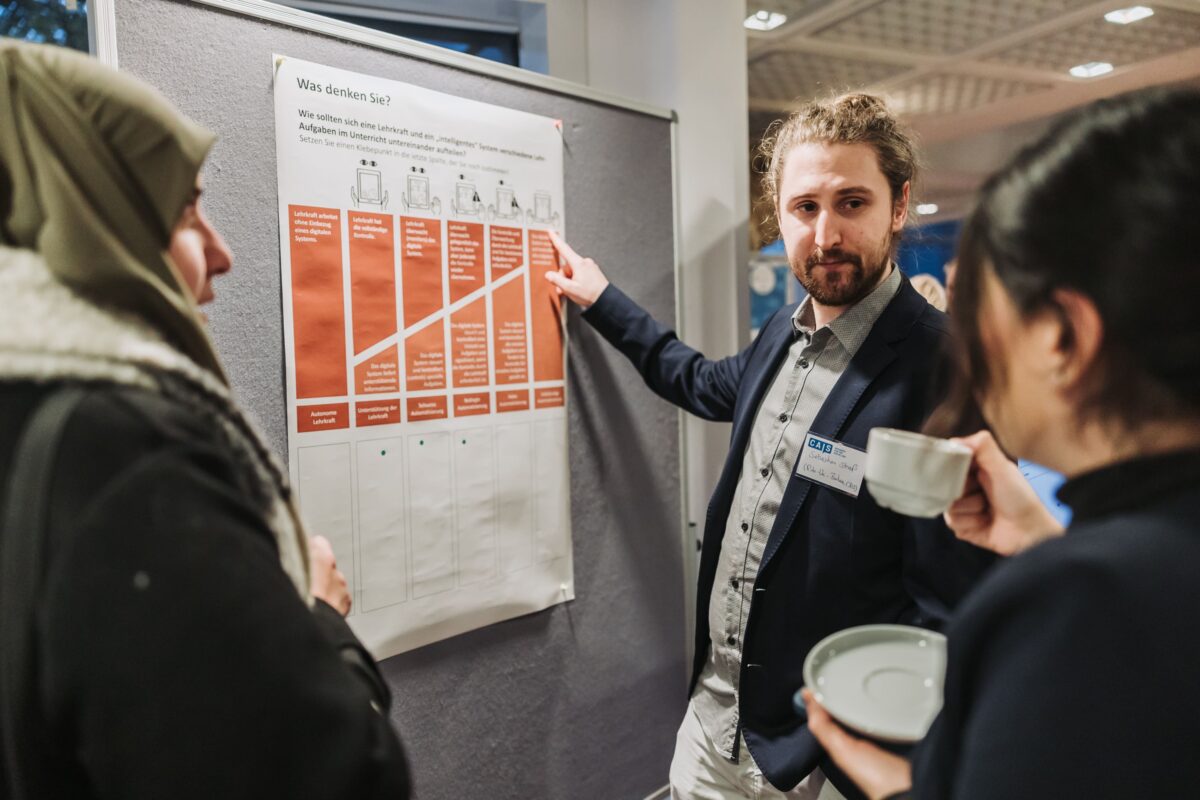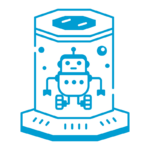Forschungsprogramm: Bildungstechnologien und Künstliche Intelligenz

Mit Fachwissen aus den Bereichen Pädagogik, pädagogische Psychologie, Medienpsychologie und Informatik untersucht das Forschungsprogramm verschiedene Aspekte des Einsatzes digitaler Technologien und künstlicher Intelligenz (KI) in pädagogischen Kontexten.

Kooperationsqualität bestimmen mit Learning Analytics
Selbstreguliertes Lernen in der Erwachsenenbildung
Aus der Perspektive des Forschungsprogramms besteht die Rolle von Technologie und KI in der Bildung darin, die menschlichen Fähigkeiten zu ergänzen, anstatt sie zu ersetzen. Die Forscher:innen erkennen den Einsatz von Technologien und ihr Potenzial an, Lernen und Lehren durch personalisierte Unterstützung zu erleichtern. Sie sind sich jedoch auch der Herausforderungen und Grenzen des Einsatzes von Technologie im Bildungswesen bewusst und bemühen sich um einen kritischen und realistischen Ansatz bei der Umsetzung.
Lernen mit KI-generierten Texten
Prof. Dr. Nikol Rummel
Direkt zu …
Forschungsbereiche
Im Bereich (1) Lernen mit Technologie & KI interessiert sich das Forschungsprogramm für individuelles Lernen und Lernen in kleinen Gruppen in verschiedenen Bildungsumgebungen wie Schulen, Hochschulen, Berufsbildung und nicht-formalen Lernumgebungen (z.B. Museen).
- Konversationelle KI in der Bildung (Alisa Maksimova) Förderung der Fähigkeit zur Zusammenarbeit in der Hochschulbildung (Sebastian Strauß)
- Lernverläufe verstehen und Kompetenzentwicklung unterstützen (Sebastian Strauß)
- Verbesserung der Überarbeitungsfähigkeiten bei der Überarbeitung von KI-generierten Texten (Anna Radtke)
- Kleingruppenarbeit in hybriden universitären Lehrveranstaltungen: Herausforderungen und effektive Unterstützungsmaßnahmen (Sabine Schermeier)
Im Bereich (2) Lehren mit Technologie und KI untersuchen die Forscher:innen die Kompetenzen und Bedürfnisse von Lehrern. Die Forscher:innen ermitteln die Chancen und Herausforderungen, denen Lehrkräfte beim Unterrichten in digitalen Umgebungen begegnen, und untersuchen, wie sie digitale Lernmaterialien anpassen. Insbesondere untersuchen die Forscher:innen die Rolle von Lehrer-Dashboards, wie sie den Lehrer:innen informieren können und wie Lehrer:innen sie nutzen können, um ihren Unterricht zu verbessern.
- Unterstützung von Lehrkräften beim Einsatz digitaler Lernsysteme im Bildungskontext (Ann-Christin Falhs)
An der Schnittstelle zwischen Lernen und Lehren untersuchen die Forscher:innen, wie Learning Analytics sowohl Lernende als auch Lehrende in Schulen, Universitäten und im außerschulischen Bereich unterstützen kann. Darüber hinaus untersucht das Team die mit KI-Tools verbundenen ethischen und datenschutzrechtlichen Implikationen.
- Lernen mit und über KI in Museen (Alisa Maksimova)
- Untersuchung der Kooperationsqualität mit Learning Analytics (Sambit Praharaj)
Projekte
Drittmittelfinanzierte Forschungsprojekte
Analyzing Learning for Individualized Competence Development in Mathematics and Science Education (ALICE): understanding learning trajectories
(Cooperation project of Ruhr University Bochum, IPN Kiel & DIPF Frankfurt)
Through digital learning environments, the understanding and performance of learners can be modeled during the learning process, and predictions can be made about the potential progress of each learner. The interdisciplinary project „ALICE“ (Analyzing Learning for Individualized Competence Development in Mathematics and Science Education) addresses this challenge by creating theoretical and methodological foundations for adaptive support of learners in mathematics and science education. In this project, digital learning materials (units for learning in the classroom) are being developed and tested, and predictive models of learner competence development are created based on the data obtained. The reconstruction of the learning trajectories is followed by an investigation of the effectiveness of the different learning trajectories students took during their learning. Based on this, we aim to develop instructional support to help students traverse through the learning unit on an effective learning trajectory.

Research on Emerging Technologies for Teaching and Learning (RETTL): Supporting collaborative reflection by K-12 teachers with analytics from intelligent tutoring software
(Cooperation project of the CMU Pittsburgh, Ruhr University Bochum & Monash University)
In recent years, intelligent tutoring systems (ITS) have become increasingly advanced and the focus of researchers. These systems offer the potential to improve student learning. At the same time, the data generated can also be used to alert teachers to situations about student learning that would otherwise have remained hidden from them. The project aims to develop a tool (through participatory design with middle-school teachers in the US) that leverages multimodal analytics from classrooms using intelligent tutoring software. Its primary purpose of the tool is to facilitate meaningful reflection by teachers. Additionally, the project aims to contribute to the advancement of scientific understanding regarding the impact of such a tool on teachers. This includes exploring how it enhances teachers‘ awareness of their students‘ learning processes, as well as teachers beliefs about effective teaching and finally how it might lead to improved classroom practices by teachers.

KI:edu.nrw – Sub-project Educational Science
The Educational Science sub-project of the research project KI:edu.nrw aims to develop data-based learning support for promoting students’ self-regulated learning competencies. In modern society, the ability to autonomous, self-regulated learning is one of the key competences. The dynamic, ever-changing world of work and daily life requires a constant, self-directed updating of knowledge and skills. However, it is not uncommon for learners to lack self-regulation skills. Furthermore, when it comes to self-regulation competencies, learners often have different support needs, which should be addressed in an individualized way. Digital learning settings offer a good opportunity to provide adaptive support to several learners at the same time, based on their learning data.
In a field study, we supported university students participating in a statistics course by providing metacognitive or motivational prompts in the Moodle course. The study showed that the support we implemented was effective for facilitating self-regulation skills. The overall aim of this sub-project is to develop a practical concept and recommendations for the implementation of Learning Analytics-based support, which could then actually be used in higher education.
Link: https://learning-aid.blogs.ruhr-uni-bochum.de/kiedu-nrw/

Aktuelles
Lernprozesse im Kontext der Digitalisierung – Aktuelle Erkenntnisse aus Large-Scale Assessments
Das Symposium auf der GEBF-Tagung zum Thema „Bildung verstehen – Partizipation erreichen – Transfer gestalten“ an der Universität Potsdam lieferte einen spannenden Einblick in aktuelle...
„Decoding the hype: can AI help create accessible and inclusive student learning?“
On February 6, 2024, join Nikol Rummel, Research Professor, as she explores the role of AI in fostering accessible and inclusive student learning. The OECD...
Podcast-Episode über künstliche Intelligenz
In einer 90-minütigen Podcast-Folge spricht Sebastian Strauß mit dem Heinefunk-Podcast vom Heinrich-Heine-Gymnasium Oberhausen.
Tagesschau Interview mit Nikol Rummel
Die ARD-Finanzredaktion spricht heute morgen (13.12.) in einem Live-Interview mit Professor Nikol Rummel online in der Live-Fernsehsendung „Update Wirtschaft“ im ARD-Kanal „tagesschau24“.
Mehrere Publikationen des BKI zusammen mit Kollegen der CMU, Pittsburgh
Das Forschungsprogramm: Bildungstechnologien und Künstliche Intelligenz hat zusammen mit der CMU in Pittsburgh einige Publikationen veröffentlicht.
„Machinic wonders: AI imaginaries in museum exhibitions“
A paper presented by Alisa Maksimova titled „Machinic wonders: AI imaginaries i museum exhibitions“ on the 24th and 25th of October.
Lernpfade (digital) begleiten: Intelligente Tutorielle Systeme
Mit einem Blog-Beitrag am Lamarr Institut arbeiten Ann-Christin Falhs, Astrid Wichmann und Nikol Rummel in Kooperation.
Multimodal Analytics for Collaborative Teacher Reflection of Human-AI Hybrid Teaching
At ECTEL 2023 Alisa Maksimova and Nikol Rummel publshed a new publication about Collaborative Teacher Reflection on AI.
New Podcast with Nikol Rummel and Laurenz Wiskott
In a new podcast episode, Nikol Rummel and Laurenz Wiskott talk with QUA-LiS NRW about Learning Technolgoies and AI.
The EdTech&AI Research team presented their academic work at EARLI 2023
At the EARLI 2023 several academic works have been presented with the participation of the research program: Education technologies and AI.
Poster at EdTech Research Forum 2023 on Teacher Dashboards
At the EdTech Research Forum 2023 a poster of Teacher Dashboard has been presented by Ann-Chstin Falhs and Lena Borgards (RUB).
VHS Kamp-Lintfort Presentation on AI & Education
Astrid Wichmann with a talk about learning and teaching with Artificial Intelligence at the VHS Kamp-Lintfort on the 1st of September.
Measuring Collaboration Quality Through Audio Data and Learning Analytics
Sambit Praharaj summarized his PhD thesis in a latest book chapter with the title: Measuring Collaboration Quality Through Audio Data and Learning.
CAIS Symposium – AI in Education in Germany: Current State and Future Developments
The symposium aims to facilitate discussions on the current state of AI in education research and implementation in Germany, while also highlighting key issues, challenges,...
Participatory design of teacher dashboards
New journal publication by N. Rummel & colleagues on teacher dashboards
Team des Forschungsprogramm BKI stark bei internationaler Konferenz vertreten
Das EdTech&AI-Forschungsprogramm wird seine Forschungsergebnisse auf der ISLS 2023 vorstellen.
Nikol Rummel ist Keynote Speakerin auf der ISLS 2023
Nikol wird einer der Hauptredner auf der ISLS 2023 vom 10. bis 15. Juni 2023 sein.
Prof. Nikol Rummel spricht auf der Jacobs Foundation Conference
Prof. Nikol Rummel unter den eingeladenen Expert:innen der Jacobs Foundation Conference.
New Podcast on Multimodal Learning Analytics
Episode 19: Multimodal Learning Analytics featuring Dr. Mutlu Cukurova (Associate Professor, University College London, UK) and Dr. Sambit Praharaj.
Technolinguistics in Practice
Alisa Maksimova will present a paper on May 24 during the conference „Technolinguistics in Practice“.
Der mAI am CAIS: Lernen Sie unsere KI-Forschung kennen
Der Mai 2023 wird deutschlandweit zum KI-Monat. Am 17. Mai 2023 geben wir drei zentrale Einblicke in unsere KI-Forschung.
Team-Retreat „Educational Technologies and AI“
The team of the research program „Educational Technologies and Artificial Intelligence“ went on a retreat from March 15 to March 16.
Computer-Supported Collaborative Learning: Die Rolle des Digitalen bei der Unterstützung von kooperativem Lernen
Neue Publikation von Sebastian Strauß und Nikol Rummel aus dem Forschungsprogramm „Bildungstechnologien und Künstliche Intelligenz“.
How combining exploratory learning with structured practice using intelligent tutoring systems fosters robust learning in the area of math
In einem neuen Fachzeitschriftenartikel schreiben N. Rummel und ihre Kollegen über das Lernen mit intelligenten Lehrsystemen im Bereich der Mathematik. Mavrikis, M., Rummel, N., Wiedmann, M. et...
Teacher Dashboards, (1) how they are perceived by teachers and (2) how teachers make use of different dashboards under time pressure
Ein neuer Beitrag wurde von unserer Forschenden Prof. Dr. Nikol Rummel ist in der Fachzeitschrift Unterrichtswissenschaften erschienen. Van Leeuwen, A., & Rummel, N. (2022). The...
Verständnis für individuelle Lernfortschritte
Unser Team des Forschungsprogramms „Bildungstechnologien und Künstliche Intelligenz“ haben einen neuen Beitrag veröffentlicht. Hierbei liegt der Themenschwerpunkt auf LPA (Learning Progression Analytics). Näheres zum Thema...
„Wie wird KI Schulen und Bildungseinrichtungen verändern?“
Ein neuer Blogbeitrag der Forschungsgruppe „Bildungstechnologie und Künstliche Intelligenz“ ist erschienen.
Zweites Forschungsprogramm startet am Center for Advanced Internet Studies
„Bildungstechnologien und Künstliche Intelligenz“ lautet der Titel des zweiten Forschungsprogramms, das im Juni 2022 am Center for Advanced Internet Studies (CAIS) in Bochum startet.
Das Team



















